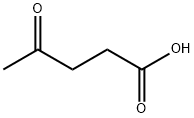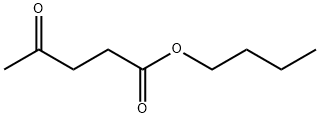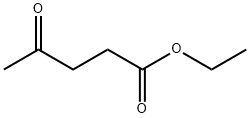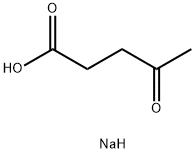A3440026
laevulinic acid , 95% , 123-76-2
Synonym(s):
4-Oxopentanoic acid;4-Oxopentanoic acid, 4-Oxovalerianic acid;4-Oxovaleric acid;Levulinic acid
CAS NO.:123-76-2
Empirical Formula: C5H8O3
Molecular Weight: 116.12
MDL number: MFCD00002796
EINECS: 204-649-2
| Pack Size | Price | Stock | Quantity |
| 50G | RMB31.20 | In Stock |
|
| 100g | RMB50.40 | In Stock |
|
| 250g | RMB79.20 | In Stock |
|
| 500g | RMB119.20 | In Stock |
|
| 1KG | RMB159.20 | In Stock |
|
| 5KG | RMB719.20 | In Stock |
|
| others | Enquire |
Update time: 2022-07-08
PRODUCT Properties
| Melting point: | 30-33 °C (lit.) |
| Boiling point: | 245-246 °C (lit.) |
| Density | 1.134 g/mL at 25 °C (lit.) |
| vapor pressure | 1 mm Hg ( 102 °C) |
| refractive index | n |
| FEMA | 2627 | LEVULINIC ACID |
| Flash point: | 280 °F |
| storage temp. | Store below +30°C. |
| solubility | 675g/l |
| form | Liquid After Melting |
| pka | pKa 4.65(H2O,t = 25,c=0.03-0.001) (Uncertain) |
| color | Clear yellow |
| Odor | at 100.00 %. sweet caramel acidic acetoin buttery |
| Odor Type | caramellic |
| biological source | synthetic |
| Water Solubility | Soluble in water ( 675g/L at 20°C). |
| Sensitive | Light Sensitive |
| Merck | 14,5472 |
| JECFA Number | 606 |
| BRN | 506796 |
| InChIKey | JOOXCMJARBKPKM-UHFFFAOYSA-N |
| LogP | -0.498 |
| Surface tension | 42.53mN/m at 298.15K |
| CAS DataBase Reference | 123-76-2(CAS DataBase Reference) |
| NIST Chemistry Reference | Pentanoic acid, 4-oxo-(123-76-2) |
| EPA Substance Registry System | Levulinic acid (123-76-2) |
Description and Uses
Levulinic acid has a tart, whiskey taste. It may be synthesized by the action of more or less concentrated HCL on sucrose, glucose, or fructose; hence, its reported presence in caramels.
Levulinic acid may be used as an analytical reference standard for the quantification of the analyte in the following:
Soy sauce using liquid chromatography coupled to mass spectrometry (LC–MS).
Liquid food samples using gas chromatography with flame ionization detection (GC-FID).
Safety
| Symbol(GHS) |   GHS05,GHS07 |
| Signal word | Danger |
| Hazard statements | H302-H317-H318 |
| Precautionary statements | P261-P264-P280-P301+P312-P302+P352-P305+P351+P338 |
| Hazard Codes | Xn,C |
| Risk Statements | 22-36/37/38-34-R34-R22 |
| Safety Statements | 26-45-36/37/39-S45-S36/37/39-S26 |
| RIDADR | 3261 |
| WGK Germany | 3 |
| RTECS | OI1575000 |
| TSCA | Yes |
| HazardClass | 8 |
| PackingGroup | III |
| HS Code | 29183000 |
| Toxicity | LD50 orally in Rabbit: 1850 mg/kg LD50 dermal Rabbit > 5000 mg/kg |





